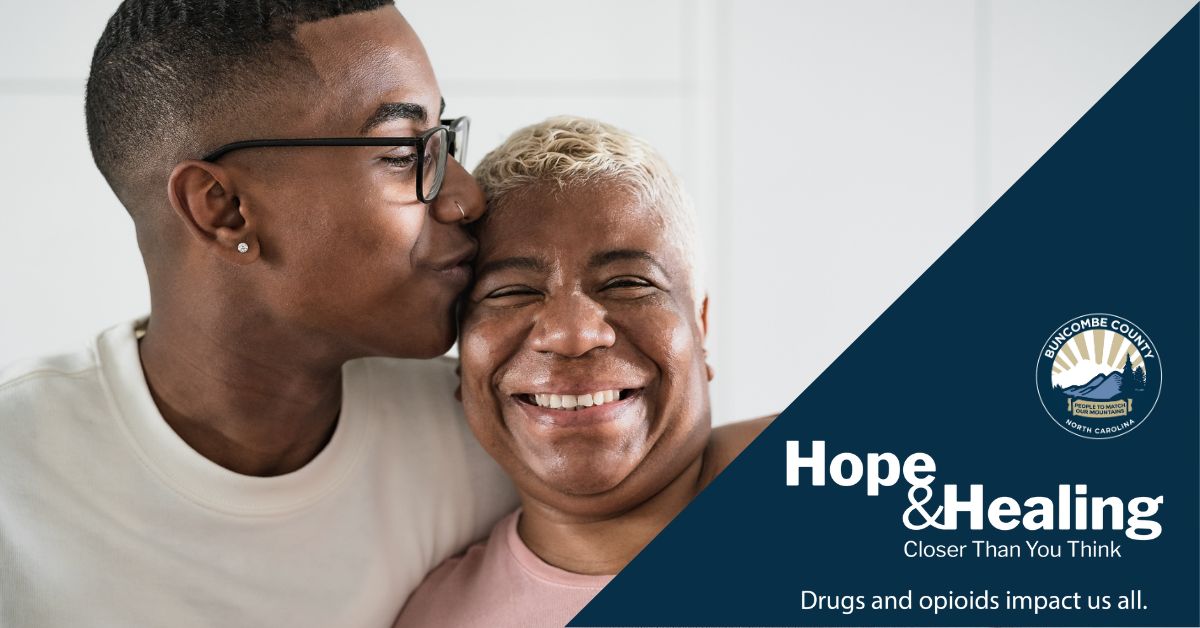
In 2015, three percent of all overdose deaths in Buncombe County were among Black, Indigenous, and People of Color (BIPOC) community members. By 2021, that number had grown to 13 percent. Across all communities, deaths by overdoses are growing, and between 2000 and 2020, more than 28,000 North Carolinians lost their lives to overdoses. Aug. 31 is Overdose Awareness Day, and while it’s a day for remembrance of lives lost, it’s also a reminder that support for opioid and polysubstance use is available.
While drugs and opioids impact all of us, whether personally or with friends, family, or loved ones, the good news is that overdose deaths are preventable. There are safe and effective ways to recover from substance use disorders, including programs like medication assisted treatment (MAT) and through the Buncombe County post overdose response team (PORT). Knowing that 40 percent of overdose deaths occur while a bystander is present, the County offers free overdose reversal training on the first Friday of each month at 12 p.m. at 40 Coxe Ave., Asheville. (Note: Due to extenuating circumstances, the training scheduled for Sept. 1 has been canceled.) Fentanyl and xylazine test strips are available for free at Buncombe County Health and Human Services, and the County’s syringe services program is also proven to support harm reduction.
In 2021, a national settlement with opioid companies brought more than $16 million to Buncombe County over 18 years. Locally, the County will use those dollars for treatment, recovery, harm reduction, and other life-saving programs and services like the community paramedic team. Read more about the opioid settlement fund here.
To help bridge care options, Buncombe County is currently piloting a program in conjunction with Mission Hospital and Mountain Area Health Education Center (MAHEC), where Buncombe’s community paramedics help individuals who enter the emergency room suffering from opioid use disorder access and continue care with MAHEC for medication assisted treatment. With the FY24 budget, Buncombe County Commissioners approved expanding the community paramedicine post overdose response and medication assisted treatment teams.
In addition, Dr. Shuchin Shukla has joined Buncombe County as a contracted medical substance use professional to help increase access to medication assisted treatment and create tailored programs for BIPOC, homeless, and LGBTQ+ community members suffering from opioid use disorder. “I have seen firsthand how evidence-based clinical treatment of addiction can be implemented through a public health lens with collaborative partnerships across agencies and departments,” said Shukla. “With my new role, I hope to further the innovative and effective responses led by the County and coordinate efforts with community partners.”
Ultimately, Overdose Awareness Day is about accessing resources, information, interventions, harm reduction, and care options before tragedy strikes.
"In my office, we handle the death certificates for everyone whose life ends in our county,” said Register of Deeds Drew Reisinger. “As we've seen day-to-day life become harder due to a number of factors, not the least of which is incredible inflation, we've seen an increase in the deaths of our friends, neighbors, and loved ones. On this Overdose Awareness Day, it's my fervent hope that we can have an honest dialogue with ourselves and others - hope and healing are truly closer than we think, regardless of insurance or income, and fentanyl test strips are free for anyone at our Health Department."
Support for individuals experiencing opioid use disorder and their loved ones is available, regardless of insurance coverage. Go to www.buncombecounty.org/safer for more information.
Local Resources:
If you are experiencing a medical emergency, call 911.
National Suicide Prevention and Crisis Lifeline (Spanish language services also available): Call 988
Call AMCHC at (828) 257-4745 for primary care, Medication Assisted Treatment (MAT), Hepatitis C and HIV treatment.
Call MAHEC at (828) 257-4730 for primary care, Medication Assisted Treatment (MAT), MAT for pregnant or postpartum people, Hepatitis C and HIV Treatment.
Call MAHEC at 828-771-3488 if you are in need of Hepatitis C and/or HIV treatment
Call VAYA Health at 1-800-849-6127 for referrals for outpatient substance use individual or group counseling.
Peer Support Services:
Call VAYA at 1-800-962-9003 to be connected to Peer Support Programs in Buncombe County
Peer Support Living Rooms-Safer space to connect to people with lived experience. Two locations in Buncombe County:
RHA’s C3@365 at 356 Biltmore Ave., Asheville or call 828-254-2700
Sunrise Community for Recovery & Wellness Drop-In Community Center at #46 Westgate Shopping Center Asheville 28806 or call 828-552-3858
Dial 252-HELP for connections to support resources in Buncombe County and across Western North Carolina.
Seek Healing Listening Line provides non-crisis emotional support between community members. Call or text any time to connect with another Seeker. Call or text: 828-547-4547; hours 8 a.m.-11 p.m.
The Share Project is a source of awareness and support for families and loved ones impacted by the drug crisis. Call 828-283-0757